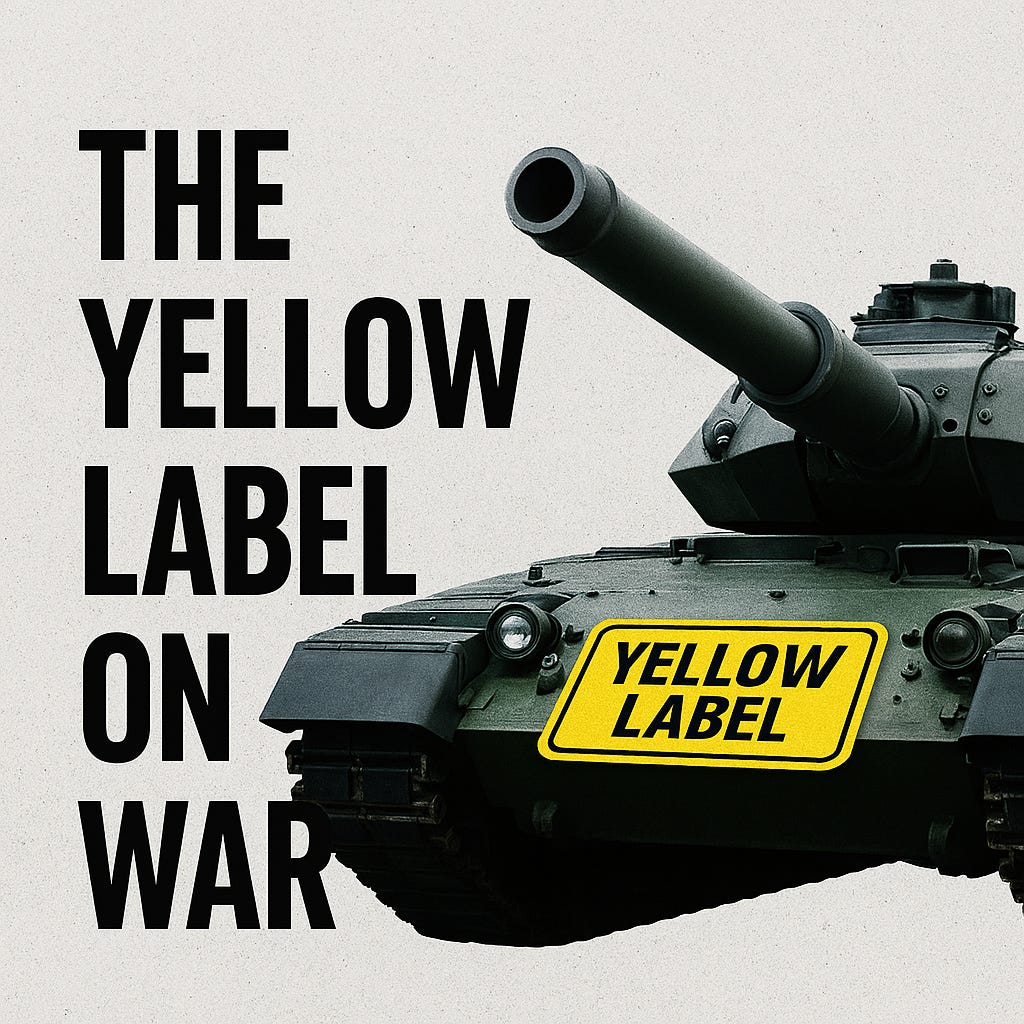GUEST POST: The Problems with the UK's Relationship with Peace.
Peace is not just a lack of war.
This is part of a weekly article series, later accompanied by a short video, that I'll be releasing every week. Make sure to follow the brand new Instagram page and that you are subscribed to the YouTube channel.
This is a guest post by Camden Bassett (@camdenbassettsocial on everything), part of the next generation of young people shaping the future. If you would like to apply to be a contributor, email stateofthedebate@gmail.com.
Problem 1: The Yellow Label on War
All weapons have expiration dates, be it from actually expiring or from technological innovation rendering them useless. If you invest in military equipment, the quicker you can use your investment, the better.
You may not even know it’s expired, and you may not even know if the enemy of the future has developed a secret counter to your weapon, so it’s better to play it safe; however, this makes being constantly prepared for war extremely expensive.
So when we invest in it, we have a few options: We can start a war and make it a good investment, or sell it on to a country like Saudi Arabia, which is in active conflict in Yemen. We can also sell it on after it becomes obsolete for our military to a less advanced military like, China, Pakistan, or Sri Lanka. Note that not everyone we sell to is our ally.1 We also have the option to just waste the billions we spend on it, and we often do.
We’ve agreed with NATO to raise our military budget to 2.5% of GDP.
But will we use it? Sell it? Or let it rot? It’s not a waste if it’s a deterrent.
But deterrence is impossible to measure.
Problem 2: The Military Industrial Complex
Part A: The Spending Cycle
The military industrial complex is the cycle that the West (particularly the US and UK) are stuck in. It has stages that form a loop.
First, we identify a threat (such as Russia).
We then launch a defence spending review to know whether we can cope with that threat, and we always err on the side of caution.
This enriches arms manufacturers because we decide we need to produce more arms to cope with the threat. They, with that newfound money, lobby for export contracts to countries like Saudi Arabia because our economy and military are too small to ever justify the amount of arms production we do domestically or are invested in.
(Lobbying comes in many different forms, but they are often subtle. For example, the 2023 Labour conference in Liverpool was sponsored by Babcock, an Arms manufacturer, but Labour is by far not an outlier. This happens across the political spectrum.)
We then have to back these countries in their various wars because we depend on them as customers to keep our defence spending afloat. So we do things like block UN inquiries into human rights abuses in Yemen to support Saudi, (Like we did in 2016).
Part B: The Equipment Trap
We buy lots of equipment and spend a lot of money fitting in these systems and integrating them into our military.
Take the Bowman radio system, which has been a staple of the British army until recently.
But it’s terrible. However, until recently, we couldn’t get rid of it because that would be too much sunk cost, and too many people domestically would lose jobs if Bowman lost that much money, and we couldn’t do it little by little because most military systems aren’t very modular, as they are closed systems, so they are completely incompatible with each other. Which makes the Yellow Label problem we identified earlier even worse!
So we’re stuck with bad gear.
The worst part is that manufacturers know it!
Unless contracts say otherwise, they hike prices - and we just cough up.
Problem 3: Conventional vs Unconventional Forces
We could never win a conventional war.
Our conventional military is small because we don’t have a large population and our economy can’t fund a large one; however, our unconventional forces?
They are world-class.
The SAS is so elite, numerous other regiments internationally borrow their motto - “Who dares wins.” MI6: Quietly topping global intelligence rankings, despite modest funding, it gets less than £4 billion, whereas Mossad and its sister agencies, which are also fighting for second place behind the CIA, get £10 billion!
Britain’s edge is intelligence and elite forces. The war of the future is a war of intelligence.
If we defund conventional units like the Rifles and invest in intelligence, NATO and Nine Eyes (The intelligence partnership we are in) might benefit.
But we’d be more reliant on the US for protection from conventional war.
And that’s… complicated, but I believe it is a necessary evil, and intelligence is a much cheaper alternative, which would mean we would be able to fund our economy to make our services more robust.
Problem 4: Soft Power
Is it better to be ready for war - or to prevent it? Britain has no shortage of soft power.
Recently, we’ve signed deals with India, the US and China.
Even as those countries struggle to get along. India–China relations remain tense after the 2020 border skirmish. US–China relations risk a trade war, and the India–US trade deal just collapsed.
Britain sits at the centre of the table.
But under NATO pressure, we’ve cut foreign aid.
And aid isn’t just charity… it’s a war-prevention strategy which is a good economic strategy, because war is expensive.
It’s cheaper to prevent a war than to sustain one.
So here’s the question:
How much are we willing to risk playing to our strengths - soft power, intelligence, diplomacy - if it means we might not have the money to defend ourselves without America?
I leave that question to you.
Thanks for reading.
Debate it out in the comments section below 👇
https://publications.parliament.uk/pa/cm199899/cmselect/cmtrdind/540/9061507.htm?




